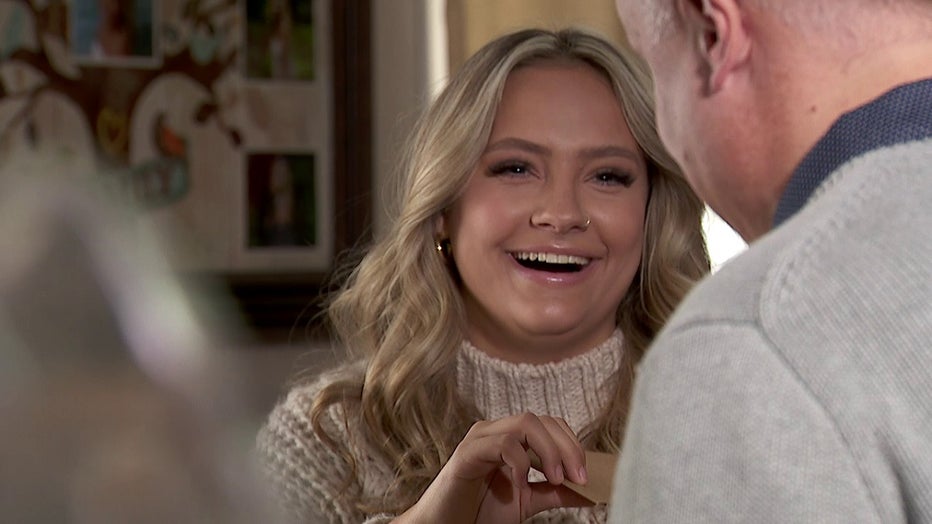22-year-old dance instructor gets kidney in paired match donation chain

Rogers woman receives kidney in a paired match donation chain
Mackenzie Meier never knew anything was wrong. Winter came and left leaving the 22-year-old dance instructor running from rehearsals to competitions. But by April, the exhaustion set in.
ROGERS, Minn. (FOX 9) - Mackenzie Meier never knew anything was wrong. Winter came and left leaving the 22-year-old dance instructor running from rehearsals to competitions. But by April, the exhaustion set in.
"I wasn’t feeling right," said Meier describing the migraines she had for about two weeks. "I just didn't have a lot of energy. But I chalk that up to being overwhelmed by doing a million things a million miles an hour."
At a doctor’s office visit, some of her vitals didn’t make sense. "Her blood pressure was severely elevated," recalled her father Jeff Meier. "And she called me and I took her to the urgent care right away. And that's when I found this all out."
The medical tests showed Mackenzie’s kidneys were failing. A biopsy confirmed she has a rare disorder called IgA nephropathy. "Basically your immune system not recognizing your kidney as part of my body," explained Mackenzie. "It just slowly attacks your kidney and causes it to essentially fail at cleaning the waste out of my blood."
IgA nephropathy is a rare autoimmune disorder and there is no cure. "It's not really genetically linked," explained Dr. Timucin Taner, a transplant surgeon at Mayo Clinic in Rochester, Minnesota. "So we can't tell if somebody would have it or not. So it comes as a surprise most of the time, just like, you know how Mackenzie found her disease."
Dr. Taner says the condition can exist in a patient for several years without exhibiting any obvious symptoms. When the symptoms do surface, the patient’s kidneys may already be failing.
"The doctors were pretty hopeful that my kidneys would bounce back," said Mackenzie. "But unfortunately, that was not the case."

Mackenzie Meier (FOX 9)
For patients such as Mackenzie the only cure is a kidney transplant. There are currently 1,900 patients waiting for a kidney transplant in Minnesota, according to LifeSource, the organization that coordinates organ donations in Minnesota, North Dakota, and western Wisconsin. Mackenzie’s parents both tested to donate a kidney to her, but her mother Chris carried an antibody that prevented her from becoming a donor. Her father was considered a perfect match, but doctors preferred a younger donor so that her organ could become a life-long transplant. That’s when they considered the option of a peer-coordinated match where Jeff would donate his kidney to someone else, and then a third donor would donate their kidney to Mackenzie.
"Peer donation really allows for better matches for recipients or potential recipients who come with a potential donor," explained Dr. Taner. Just like the Meier family, many willing donors are not a perfect match for their loved one needing a kidney. But that doesn’t mean they aren’t a perfect match for someone else.
"So in those conditions, the paired matching or exchange programs really allow for a better kidney to be transplanted into the recipients," said Dr. Taner.
On November 22, Jeff and Mackenzie were both wheeled into operating rooms at Mayo Clinic. Jeff’s kidney was harvested by Dr. Taner and transplanted into another patient who Jeff only knows was someone from the Chicago area. Mackenzie received her kidney from a perfectly matched living donor who she does not know. In all, three patients received a new kidney from three donors in that transplant program called six paired-match chain.
"We have participated in chains as long as ten people," said Dr. Taner. "But nationally, you know, there have been chains that went up to 20 people, which is just a just an amazing thing. If you think about it, 20 people, ten people, they're getting really perfect matched kidneys for them, even if their immediate donor is not a match for them."
More than a month since her receiving her new kidney, Mackenzie says it’s working well. She’s on anti-rejection medications and for the moment can’t lift more than ten pounds, but she’s finally returning to teaching at the dance studio.
"It was less than a year that we were able to make this turnaround," Mackenzie reflected. "So and that wouldn't have been possible without this paired donation program and the generosity of people who are willing to give a kidney to somebody for a second life."
The number of living kidney donations are growing. According to LifeSource, Minnesota transplant centers have performed 549 kidney transplants so far in 2022, 236 of them coming from living donors. Dr. Taner says Mayo Clinic alone transplanted 304 kidneys so far this year, a new record.
Anyone looking to learn more about becoming a living donor can visit LifeSource or the Mayo Clinic website.
"But now going through this and just knowing how many people out there are in need of kidney donations or other organ donations, that's something I would encourage anyone to do," said Jeff Meier.

